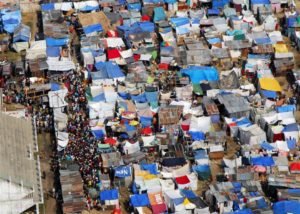
The Haitian government and international organizations have identified at least three tent cities that have sprung up in drought-stricken southern Haiti, near the border. Here, the newly returned — or newly deported — Haitians are clearing land and living in makeshift camps with no amenities.
Two of the sites, located north of the Haitian border town of Anse-a-Pitres, have tripled in population in the past month, according to estimates of aid workers who have visited.
A third camp has been confirmed farther north along the border in Malpasse.
With the reliance on donated food and water scarce, local and international aid agencies worry that without swift action, these camps could swell and desperation rise.
One island, two nations, a long quarrel
For years, Haiti and the Dominican Republic — two nations that share one island — have quarreled over the issue of migration and the strict immigration enforcement efforts spearheaded by the Dominican government.
Much of the fight has been about the effects of a Dominican law to require all undocumented immigrants to get “regularized” or face deportation. Simultaneously, another registration law was enforced to restore the status of tens of thousands of Dominicans of Haitian descent who were stripped of their birthright citizenship after a 2013 court ruling.
Despite criticism from the international community, the Dominican government has stood by its immigration laws. They were designed to be solutions to two problems: Dealing with the large number of undocumented immigrants living in the Dominican Republic and restoring the rights of the more than 200,000 Dominicans who lost their citizenship as a result of the 2013 court ruling.
On a recent trip through both countries, many Haitians told CNN that they favored a process to gain legal status and to register with the government. But, most also said that the requirements set out in the laws to obtain legal status are too onerous.
Especially among the poorest Haitian immigrants, the cost and time required to gather the documents is too much for many. With the deadlines passed, fears of potential mass deportations have pressured many Haitians — including some born in the Dominican Republic — to leave the country voluntarily.
No massive operations to detain and remove migrants has come to pass, but the fear lingers.
Read more at cnn.com

